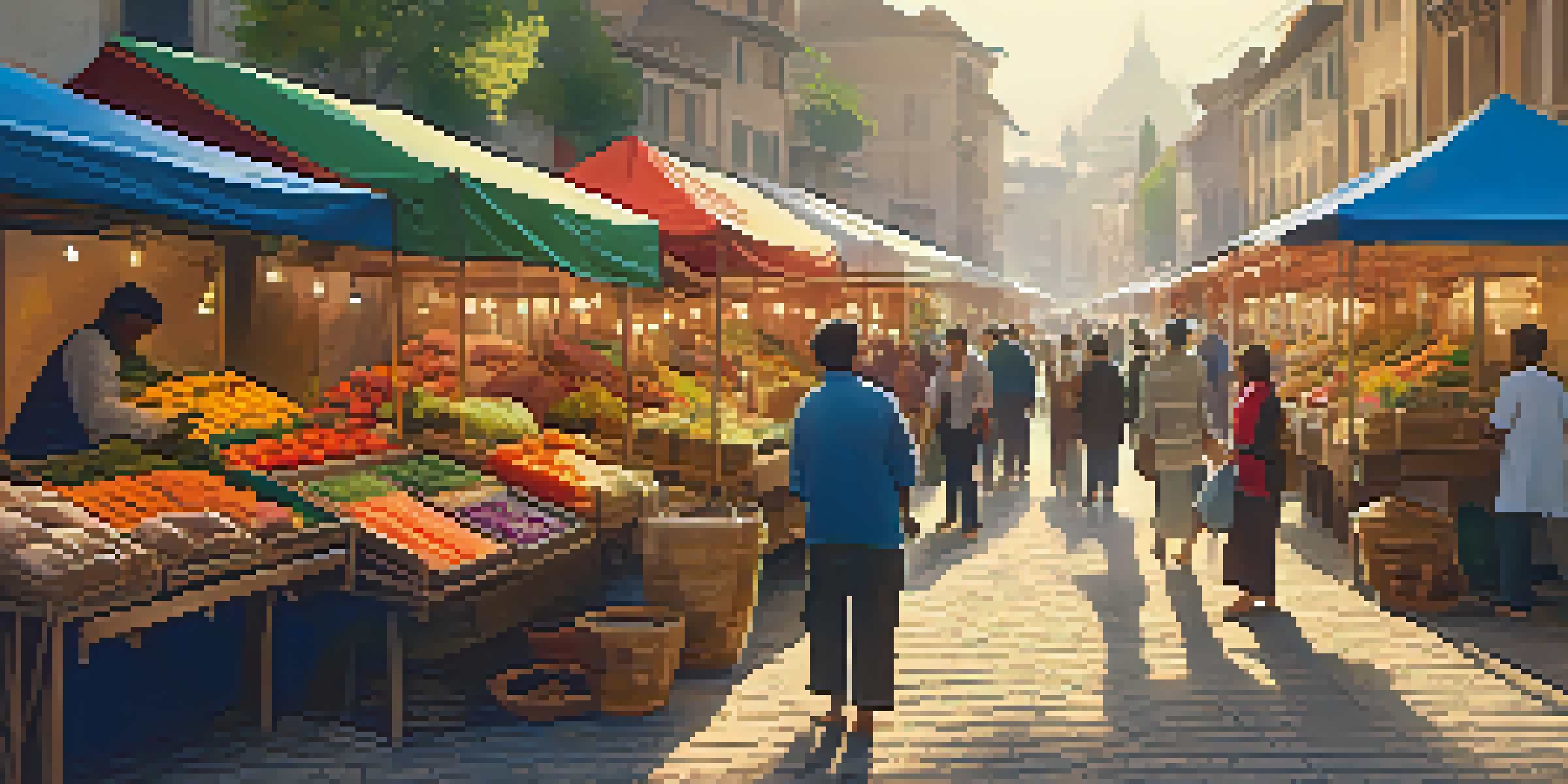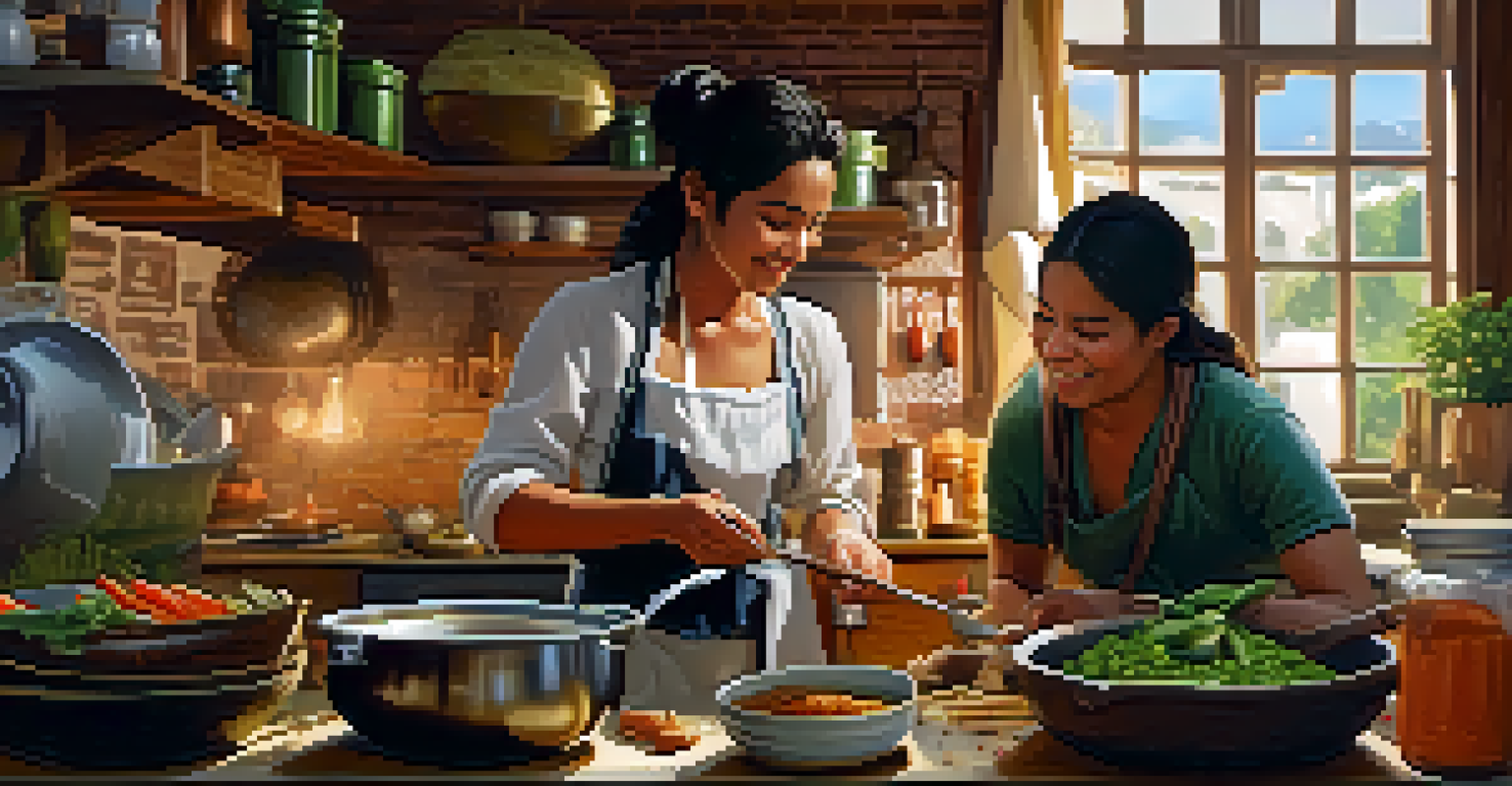Cultural Exchanges: Bridging Gaps Between Travelers and Locals

Understanding Cultural Exchanges and Their Importance
Cultural exchanges refer to the sharing of ideas, traditions, and experiences between travelers and locals. They play a crucial role in enhancing mutual understanding and appreciation of diverse cultures. When travelers immerse themselves in local customs, they gain insights that go beyond typical tourist experiences.
Traveling – it leaves you speechless, then turns you into a storyteller.
Imagine visiting a bustling market in a foreign country, where the colors, sounds, and aromas create a sensory feast. By engaging with local artisans and vendors, travelers can learn about the history and significance of the products being sold. These interactions often lead to memorable stories that enrich both the traveler’s journey and the local's experience.
Ultimately, cultural exchanges serve as a bridge between different ways of life. They foster respect and empathy, breaking down stereotypes and misconceptions that can exist between cultures. This exchange creates a foundation for meaningful relationships that can last long after the trip has ended.
The Role of Local Guides in Cultural Exchanges
Local guides are the heart and soul of cultural exchanges. They not only show travelers the sights but also share insights into the daily lives and traditions of their communities. Their intimate knowledge transforms a simple tour into an enriching experience filled with stories and anecdotes.

Consider a local guide leading a group through a historic neighborhood. As they recount tales of the area's past, travelers are not just learning facts; they're connecting emotionally with the place. This personal touch fosters a sense of belonging, making travelers feel like they’re part of something bigger.
Cultural Exchanges Foster Understanding
Engaging with local customs and traditions enhances mutual appreciation and respect between travelers and locals.
Moreover, local guides help travelers navigate cultural nuances that might otherwise go unnoticed. They provide context for local customs, etiquette, and even the unspoken rules of interaction. This guidance ensures that travelers engage respectfully and meaningfully with the local culture.
How Food Plays a Central Role in Cultural Exchange
Food is perhaps one of the most delicious ways to bridge cultural gaps. Sharing a meal with locals allows travelers to taste authentic flavors and understand the significance behind each dish. It's a sensory experience that transcends language barriers and fosters connection.
The world is a book and those who do not travel read only one page.
Picture a traveler learning to cook a traditional dish in a local's kitchen. This hands-on experience not only imparts culinary skills but also reveals the cultural stories behind the ingredients and cooking methods. Such shared moments create lasting memories that travelers cherish long after returning home.
In addition, food brings people together, creating an atmosphere of warmth and camaraderie. Whether it's at a bustling street food stall or a family dinner, the act of breaking bread encourages conversations that deepen understanding and appreciation of each other’s cultures.
Volunteering: Engaging with Communities Through Service
Volunteering while traveling offers a unique opportunity for cultural exchange. By contributing to local projects, travelers can immerse themselves in the community and witness its challenges and triumphs firsthand. This engagement often leads to deeper connections and a more profound understanding of local issues.
For instance, a traveler who volunteers at a wildlife conservation project might learn about the delicate balance between nature and local livelihoods. Through hands-on work and interactions with community members, they gain insights that tourists typically miss. This experience can be transformative, fostering a sense of responsibility towards global communities.
Local Guides Enhance Travel Experiences
Local guides provide invaluable insights into the culture, transforming tours into enriching experiences filled with personal stories.
Moreover, volunteering allows travelers to give back, creating a reciprocal relationship. Locals appreciate the effort and support, while travelers leave with enriched perspectives and memories that last a lifetime. It’s a beautiful cycle of learning and giving that benefits everyone involved.
Art and Music as Universal Languages of Exchange
Art and music are powerful forms of cultural expression that can bridge gaps between travelers and locals. They serve as universal languages that convey emotions, stories, and experiences without the need for words. Engaging with local art and music can be a profound way to connect with a culture.
Imagine attending a local festival where traditional music fills the air. Participating in dances and listening to stories through song can create an immediate bond with the community. Such experiences allow travelers to appreciate the cultural heritage and artistic expressions that define a place.
Additionally, art often reflects the history and struggles of a community. Travelers who take the time to explore local galleries or attend workshops can gain a deeper understanding of the cultural narratives behind the artwork. This appreciation can lead to meaningful conversations and connections that celebrate diversity.
Language: The Gateway to Authentic Cultural Exchange
Language is a crucial element in fostering genuine cultural exchanges. Even a few basic phrases can open doors and create connections with locals. By attempting to communicate in the local language, travelers show respect and appreciation for the culture, which often leads to warmer interactions.
Think about the joy of ordering food in a restaurant using the local language. Not only does it enhance the dining experience, but it also encourages locals to engage more openly with travelers. This effort can lead to conversations that unveil hidden gems of local culture and traditions.
Food Unites Through Shared Experiences
Sharing meals with locals allows travelers to taste authentic dishes while understanding the cultural significance behind them.
Moreover, learning the local language can help travelers navigate everyday situations with ease. From asking for directions to sharing stories, language becomes a bridge that connects people on a more personal level. This connection can transform a trip into a rich tapestry of interactions and friendships.
Challenges of Cultural Exchanges and How to Overcome Them
While cultural exchanges can be enriching, they are not without challenges. Travelers may sometimes encounter language barriers, cultural misunderstandings, or even unintentional disrespect. Acknowledging these challenges is the first step toward overcoming them and fostering positive interactions.
For instance, a traveler might unknowingly commit a cultural faux pas. Instead of feeling embarrassed, they can view the situation as a learning opportunity. Engaging in open dialogue with locals can clarify misunderstandings and deepen mutual respect, turning a potentially awkward moment into a meaningful exchange.

Additionally, being aware of one's own cultural biases can help travelers approach interactions with an open mind. Embracing the unfamiliar and being willing to learn from locals can pave the way for authentic connections. By doing so, travelers contribute to a richer cultural tapestry that benefits everyone involved.
The Lasting Impact of Cultural Exchanges on Travelers and Locals
Cultural exchanges leave a lasting impact on both travelers and locals. For travelers, these experiences often shift perspectives, leading to greater empathy and understanding of global issues. They return home not just with souvenirs, but with stories and insights that shape their worldview.
Locals, too, benefit from these interactions. They gain new perspectives from travelers, which can inspire pride in their own culture and encourage them to share their stories. This exchange creates a sense of community and belonging, bridging gaps that may have once existed.
Ultimately, cultural exchanges foster a spirit of connection that transcends geographical boundaries. They remind us that while we may come from different backgrounds, our shared human experiences unite us. By embracing these exchanges, we build a more compassionate and interconnected world.